Abstract
1. Isolated preparations of rat anococcygeus muscle were incubated with [3H]-noradrenaline and the efflux of radioactivity induced by stimulation of intramural sympathetic nerves was used as a measure of release of transmitter noradrenaline. Isometric contractile responses were also measured. 2. Angiotensin I (0.03 microM) and angiotensin II (0.03 microM) produced non-sustained contractile responses and enhanced the stimulation-induced (S-I) effluxes of radioactivity as well as the contractile responses to electrical stimulation. These effects were blocked by the angiotensin II receptor antagonist saralasin (0.03 microM), and the effect of angiotensin I, but not angiotensin II, was blocked by the angiotensin converting enzyme inhibitor captopril (0.1 microm). 3. The findings indicate that there are both pre- and postjunctional receptors for angiotensin II and that angiotensin I is converted to angiotensin II in the anococcygeus muscle preparation. 4. Isoprenaline (0.1 microM) slightly enhanced the S-I efflux of radioactivity, and produced a greater enhancement after neuronal uptake blockade with desipramine (0.03 microm) and alpha-adrenoceptor blockade with phentolamine (1 microM). 5. The facilitatory effect of isoprenaline on S-I efflux of radioactivity was abolished by propranolol (0.3 microM), but was not affected by low concentrations of saralasin (0.03 microM) or captopril (0.1 microM) which abolished the effect of angiotensin I. The findings suggest that isoprenaline acts directly on prejunctional beta-adrenoceptors to enhance S-I noradrenaline release, rather than indirectly by releasing angiotensin II from within the tissue. Higher concentrations of saralasin (0.1 microM) or captopril (5 microM) did block the facilitatory effect of isoprenaline. The significance of this finding is not clear.
Full text
PDF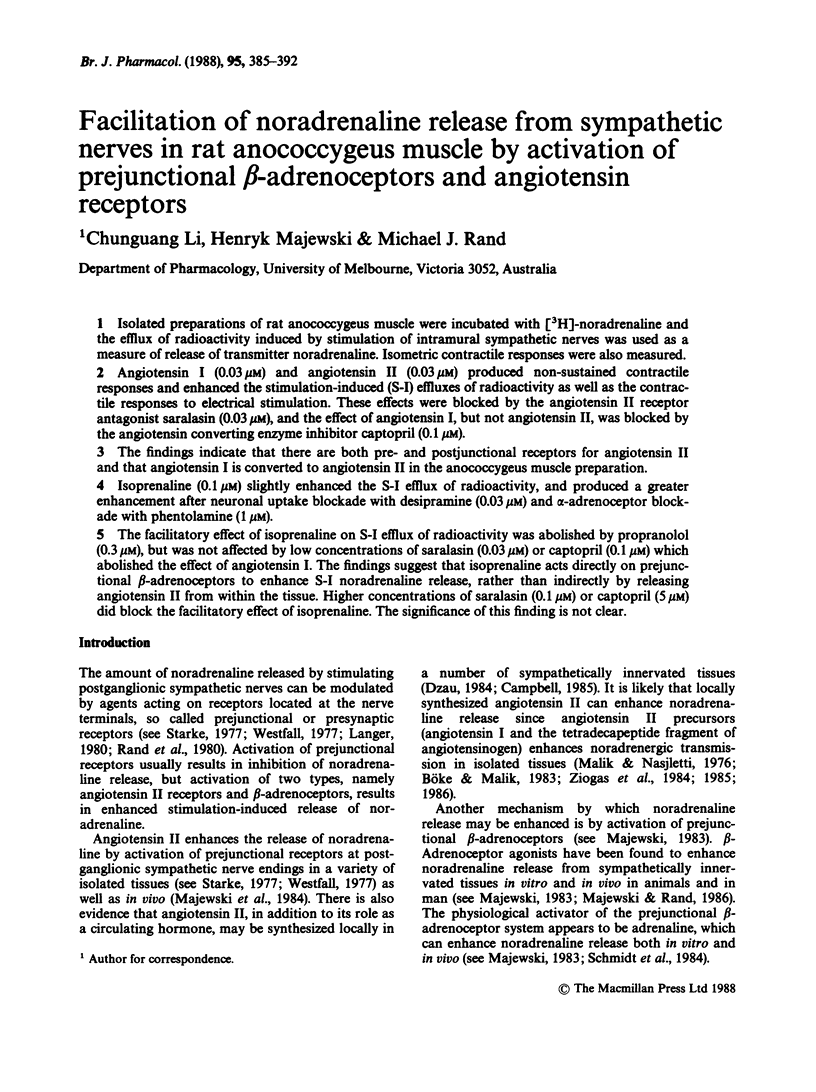
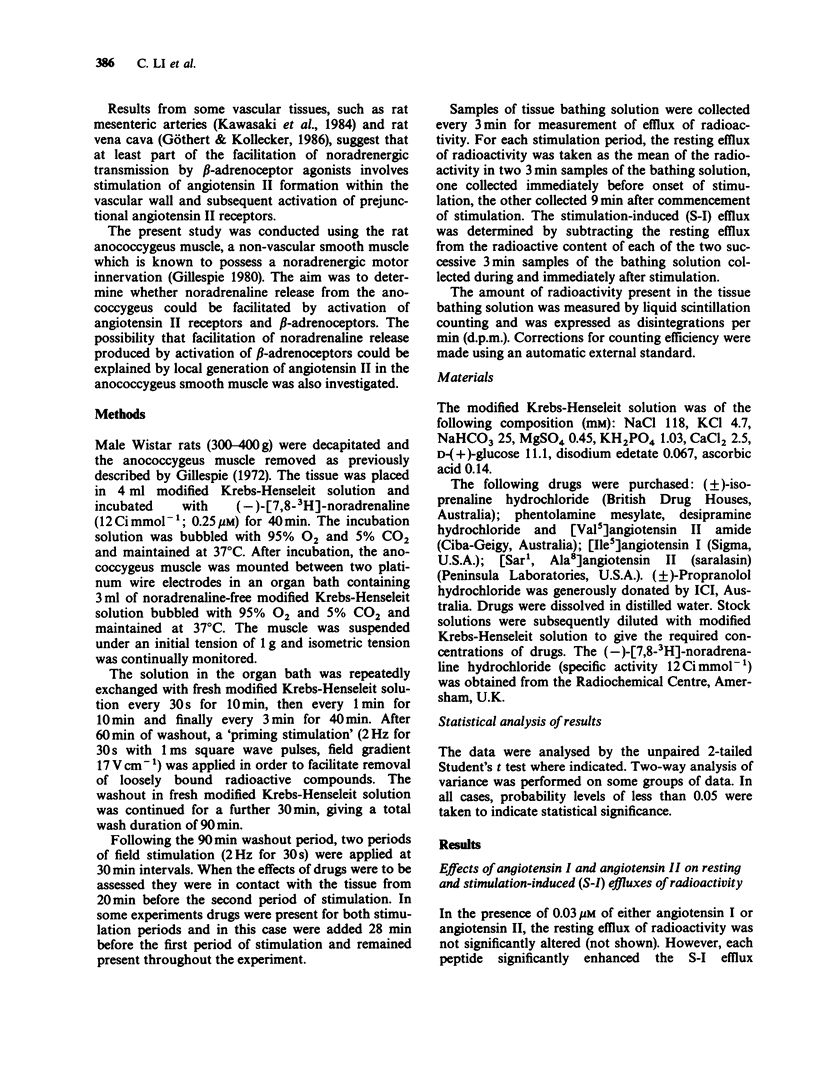
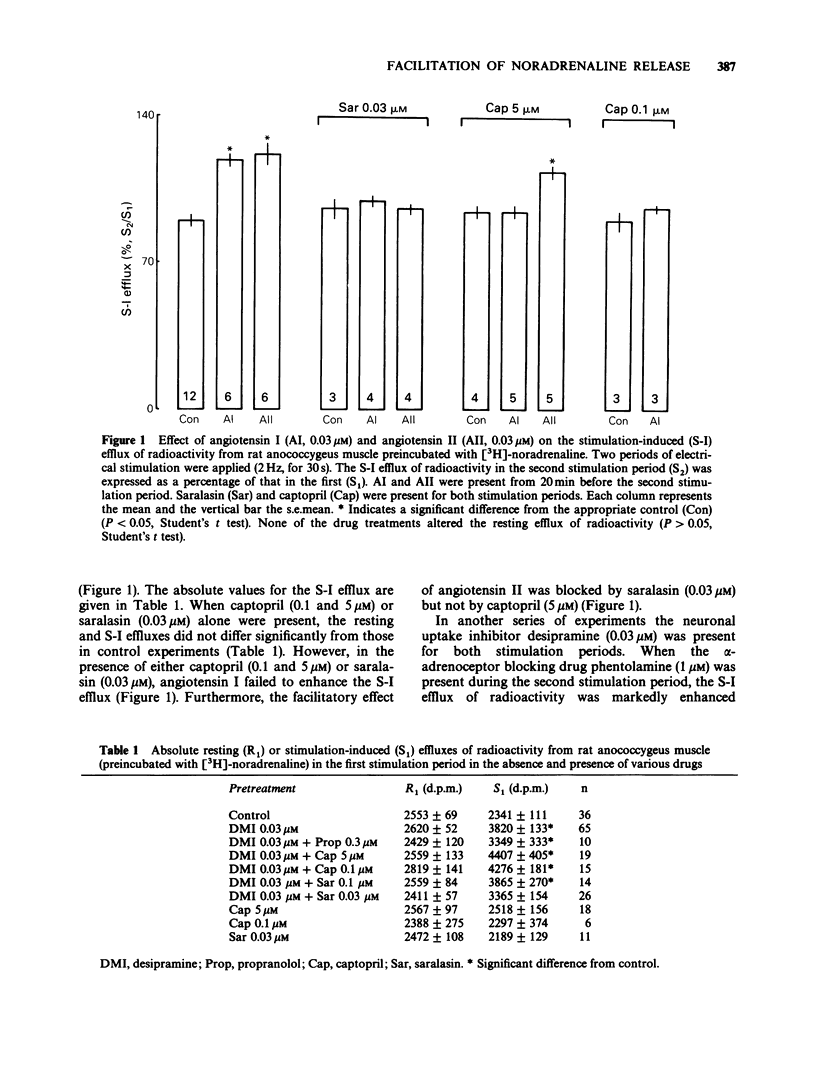
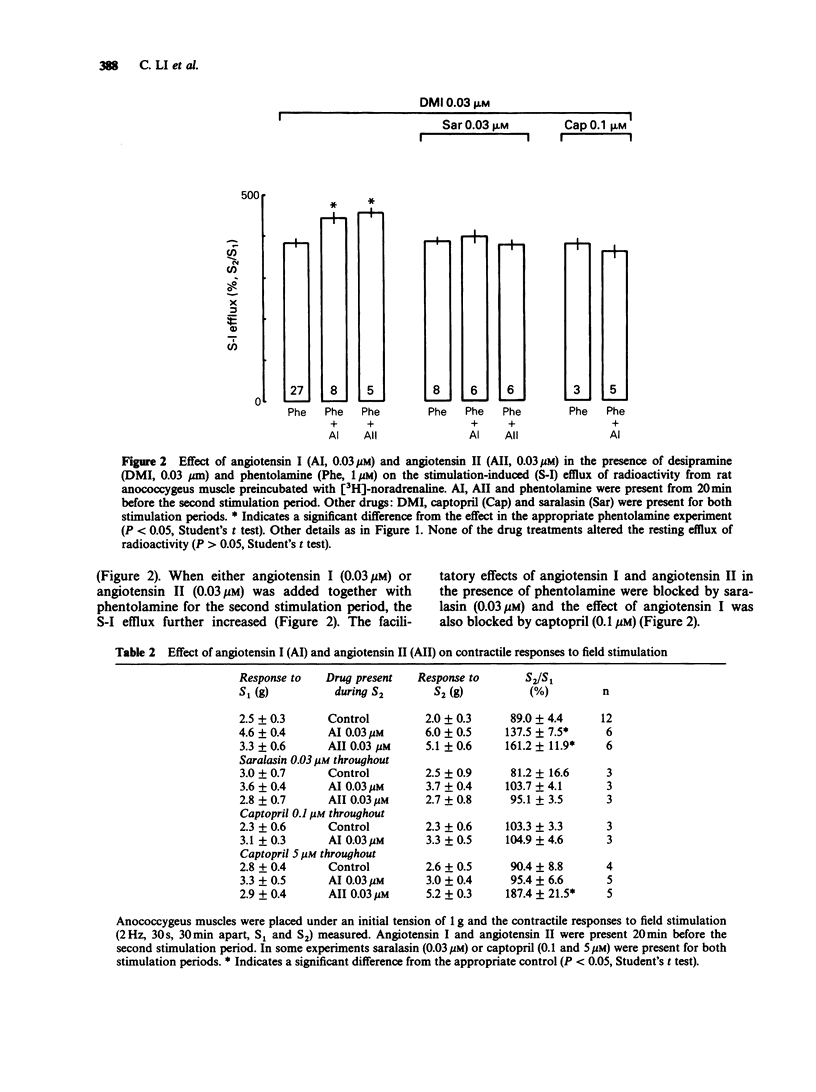
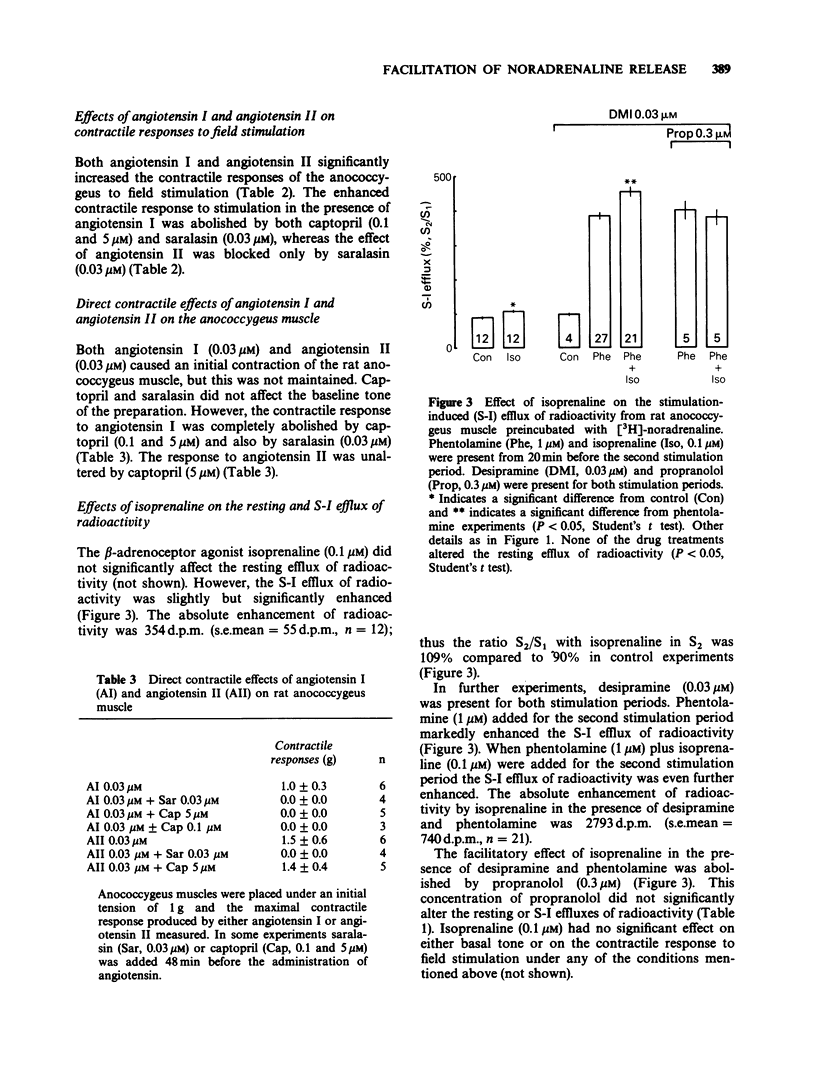
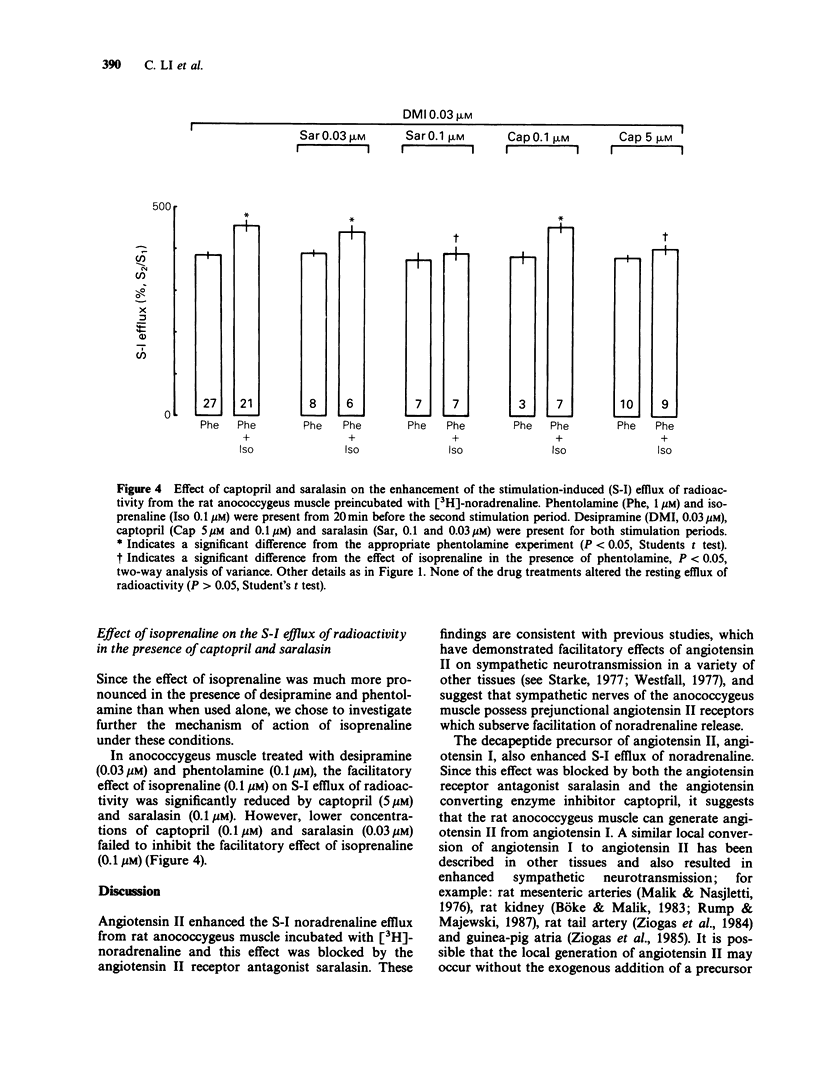
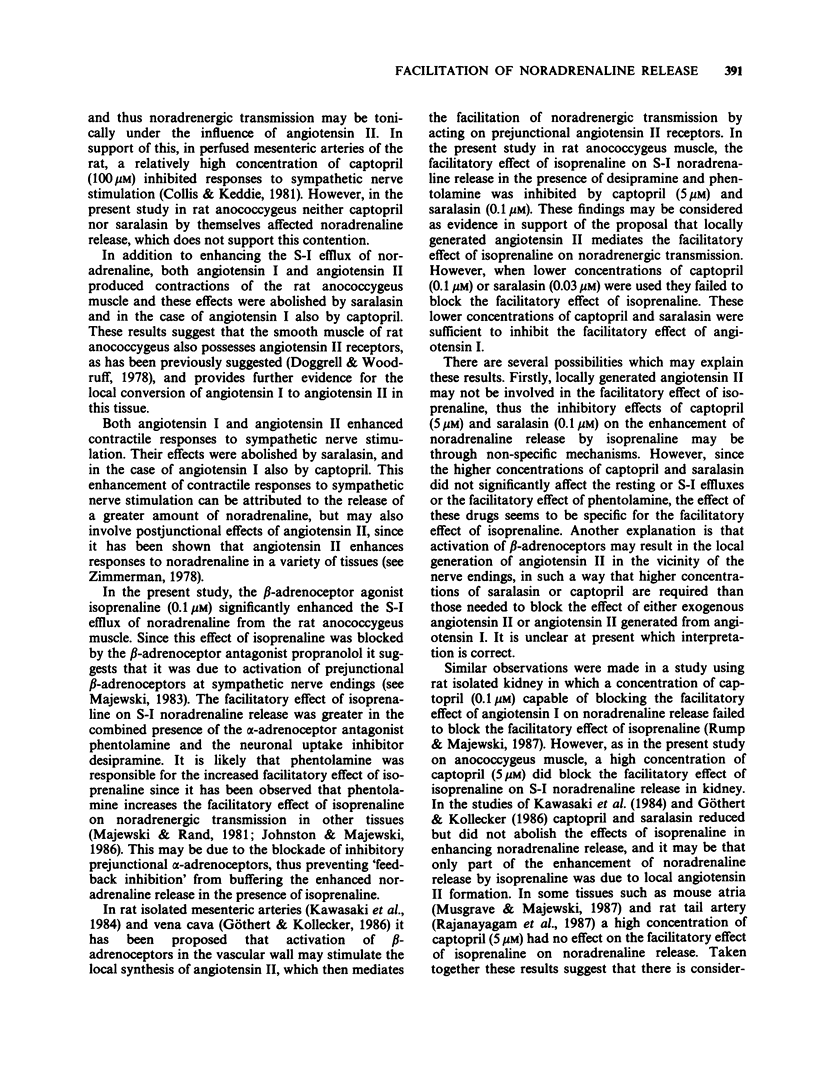
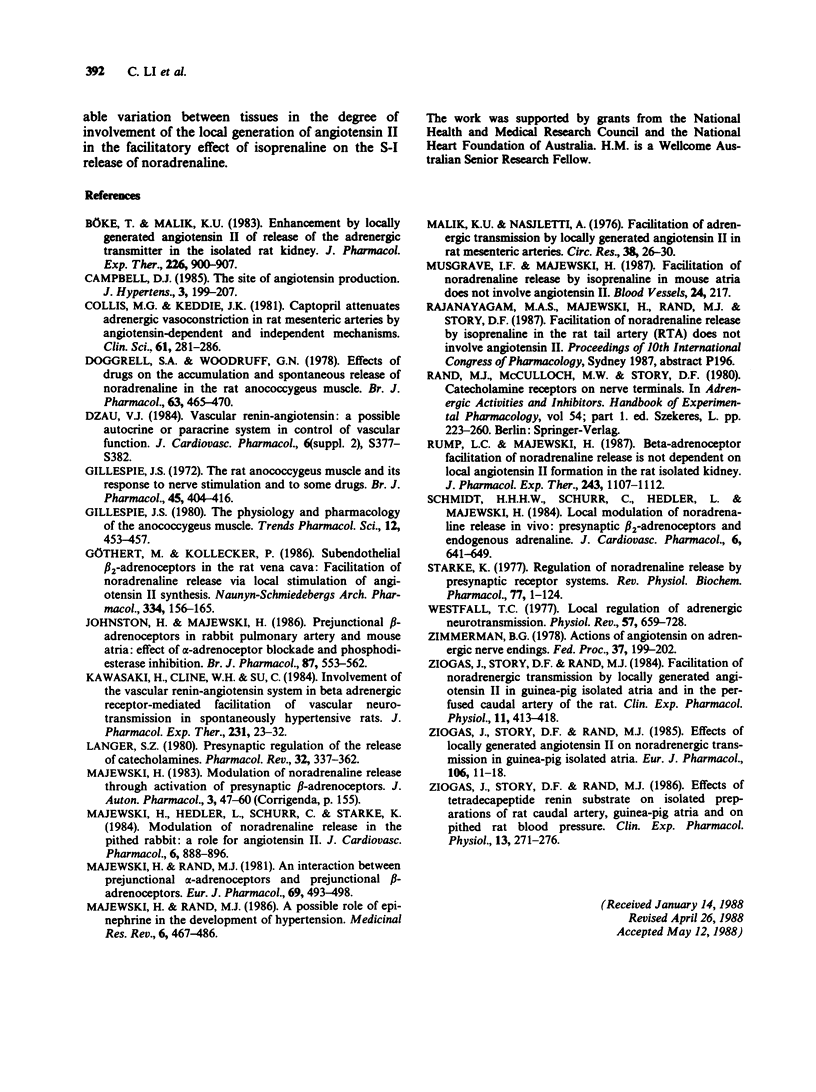
Selected References
These references are in PubMed. This may not be the complete list of references from this article.
- Böke T., Malik K. U. Enhancement by locally generated angiotensin II of release of the adrenergic transmitter in the isolated rat kidney. J Pharmacol Exp Ther. 1983 Sep;226(3):900–907. [PubMed] [Google Scholar]
- Campbell D. J. The site of angiotensin production. J Hypertens. 1985 Jun;3(3):199–207. doi: 10.1097/00004872-198506000-00002. [DOI] [PubMed] [Google Scholar]
- Collis M. G., Keddie J. R. Captopril attenuates adrenergic vasoconstriction in rat mesenteric arteries by angiotensin-dependent and -independent mechanisms. Clin Sci (Lond) 1981 Sep;61(3):281–286. doi: 10.1042/cs0610281. [DOI] [PubMed] [Google Scholar]
- Doggrell S. A., Woodruff G. N. Effects of drugs on the accumulation and spontaneous release of noradrenaline in the rat anococcygeus muscle. Br J Pharmacol. 1978 Jul;63(3):465–470. doi: 10.1111/j.1476-5381.1978.tb07798.x. [DOI] [PMC free article] [PubMed] [Google Scholar]
- Dzau V. J. Vascular renin-angiotensin: a possible autocrine or paracrine system in control of vascular function. J Cardiovasc Pharmacol. 1984;6 (Suppl 2):S377–S382. [PubMed] [Google Scholar]
- Gillespie J. S. The rat anococcygeus muscle and its response to nerve stimulation and to some drugs. Br J Pharmacol. 1972 Jul;45(3):404–416. doi: 10.1111/j.1476-5381.1972.tb08097.x. [DOI] [PMC free article] [PubMed] [Google Scholar]
- Göthert M., Kollecker P. Subendothelial beta 2-adrenoceptors in the rat vena cava: facilitation of noradrenaline release via local stimulation of angiotensin II synthesis. Naunyn Schmiedebergs Arch Pharmacol. 1986 Oct;334(2):156–165. doi: 10.1007/BF00505816. [DOI] [PubMed] [Google Scholar]
- Johnston H., Majewski H. Prejunctional beta-adrenoceptors in rabbit pulmonary artery and mouse atria: effect of alpha-adrenoceptor blockade and phosphodiesterase inhibition. Br J Pharmacol. 1986 Mar;87(3):553–562. doi: 10.1111/j.1476-5381.1986.tb10197.x. [DOI] [PMC free article] [PubMed] [Google Scholar]
- Kawasaki H., Cline W. H., Jr, Su C. Involvement of the vascular renin-angiotensin system in beta adrenergic receptor-mediated facilitation of vascular neurotransmission in spontaneously hypertensive rats. J Pharmacol Exp Ther. 1984 Oct;231(1):23–32. [PubMed] [Google Scholar]
- Langer S. Z. Presynaptic regulation of the release of catecholamines. Pharmacol Rev. 1980 Dec;32(4):337–362. [PubMed] [Google Scholar]
- Majewski H., Hedler L., Schurr C., Starke K. Modulation of noradrenaline release in the pithed rabbit: a role for angiotensin II. J Cardiovasc Pharmacol. 1984 Sep-Oct;6(5):888–896. doi: 10.1097/00005344-198409000-00023. [DOI] [PubMed] [Google Scholar]
- Majewski H. Modulation of noradrenaline release through activation of presynaptic beta-adrenoreceptors. J Auton Pharmacol. 1983 Mar;3(1):47–60. doi: 10.1111/j.1474-8673.1983.tb00496.x. [DOI] [PubMed] [Google Scholar]
- Majewski H., Rand M. J. A possible role of epinephrine in the development of hypertension. Med Res Rev. 1986 Oct-Dec;6(4):467–486. doi: 10.1002/med.2610060405. [DOI] [PubMed] [Google Scholar]
- Majewski H., Rand M. J. An interaction between prejunctional alpha-adrenoceptors and prejunctional beta-adrenoceptors. Eur J Pharmacol. 1981 Feb 19;69(4):493–498. doi: 10.1016/0014-2999(81)90455-6. [DOI] [PubMed] [Google Scholar]
- Malik K. U., Nasjletti A. Facilitation of adrenergic transmission by locally generated angiotensin II in rat mesenteric arteries. Circ Res. 1976 Jan;38(1):26–30. doi: 10.1161/01.res.38.1.26. [DOI] [PubMed] [Google Scholar]
- Rump L. C., Majewski H. Beta adrenoceptor facilitation of norepinephrine release is not dependent on local angiotensin II formation in the rat isolated kidney. J Pharmacol Exp Ther. 1987 Dec;243(3):1107–1112. [PubMed] [Google Scholar]
- Schmidt H. H., Schurr C., Hedler L., Majewski H. Local modulation of noradrenaline release in vivo: presynaptic beta 2-adrenoceptors and endogenous adrenaline. J Cardiovasc Pharmacol. 1984 Jul-Aug;6(4):641–649. doi: 10.1097/00005344-198407000-00014. [DOI] [PubMed] [Google Scholar]
- Starke K. Regulation of noradrenaline release by presynaptic receptor systems. Rev Physiol Biochem Pharmacol. 1977;77:1–124. doi: 10.1007/BFb0050157. [DOI] [PubMed] [Google Scholar]
- Westfall T. C. Local regulation of adrenergic neurotransmission. Physiol Rev. 1977 Oct;57(4):659–728. doi: 10.1152/physrev.1977.57.4.659. [DOI] [PubMed] [Google Scholar]
- Zimmerman B. G. Actions of angiotensin on adrenergic nerve endings. Fed Proc. 1978 Feb;37(2):199–202. [PubMed] [Google Scholar]
- Ziogas J., Story D. F., Rand M. J. Effects of locally generated angiotensin II on noradrenergic transmission in guinea-pig isolated atria. Eur J Pharmacol. 1984 Oct 30;106(1):11–18. doi: 10.1016/0014-2999(84)90672-1. [DOI] [PubMed] [Google Scholar]
- Ziogas J., Story D. F., Rand M. J. Effects of tetradecapeptide renin substrate on isolated preparations of rat caudal artery, guinea-pig atria and on pithed rat blood pressure. Clin Exp Pharmacol Physiol. 1986 Apr;13(4):271–276. doi: 10.1111/j.1440-1681.1986.tb00347.x. [DOI] [PubMed] [Google Scholar]
- Ziogas J., Story D. F., Rand M. J. Facilitation of noradrenergic transmission by locally generated angiotensin II in guinea-pig isolated atria and in the perfused caudal artery of the rat. Clin Exp Pharmacol Physiol. 1984 Jul-Aug;11(4):413–418. doi: 10.1111/j.1440-1681.1984.tb00290.x. [DOI] [PubMed] [Google Scholar]


